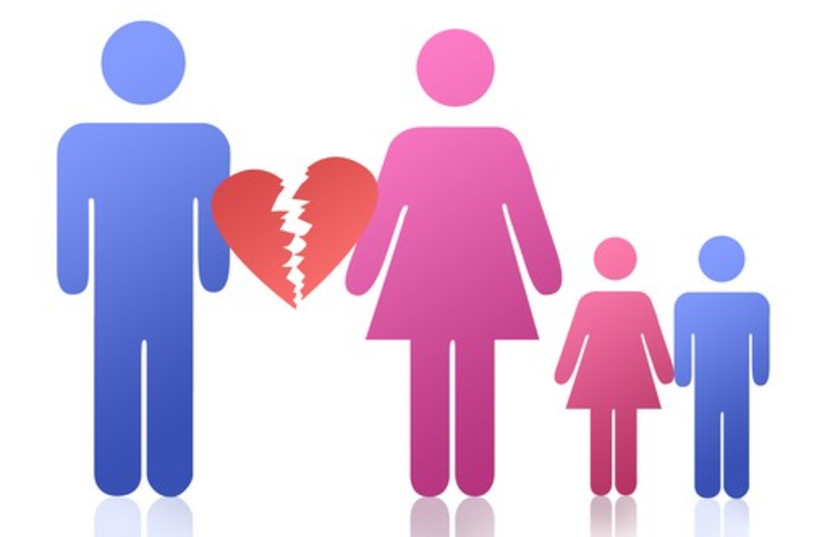Imagine a man coming before an all-women tribunal to decide his divorce. And not just any women – but women who come from communities where only women can lead, where men are separated and covered. Judges are educated in a tradition of only women’s wisdom, that can only be taught by women to women. It sounds Kafkaesque and absurd. Would we ever allow it? I doubt it. And we shouldn’t.
So why do we tolerate it for women?
At the heart of our marriage and divorce system is an essential inequality. Women are not free to leave their marriage without their husband’s explicit consent. Indeed, their entire interaction with their husband is arbitrated by other men.
Every Jewish woman in the State of Israel who wishes to divorce has to come before a panel of three religious court judges, all-male, ultra-Orthodox rabbis. These men hold her future in their hands – her freedom, her ability to remarry, to have children. To them, she must explain the intimate details of her married life, even her sex life. To these three men, she must sometimes share the details of traumatic abuse – sexual, physical, emotional and other abuse.
It is these men that she must convince of her entitlement to go free from her marriage. It is these men who decide whether to compel her husband to free her, or not. It is these men who many times decide she needs to pay him, cover his debts, give up assets, grant him greater custody of the children and so on, in order to go free. The most sensitive decisions over the most significant and important parts of her private life. All in their hands.

What is the special qualification these men bring to understand other people’s married lives and decide on their personal relationships? Apparently, the supreme qualification is their understanding of ancient religious texts, based on learning acquired in exclusively all-male environments, from all-male authorities.
They bring to the role very limited understanding and respect for the lives and challenges of modern secular or traditional women, let alone women in their own communities. As evidenced by the recent case of Chaim Walder, the response to victims of abuse has often been shockingly contemptuous.
Only a few years ago, a woman was represented by Mavoi Satum’s lawyers who had been physically abused by her husband for many years, until she finally got up the courage to leave him. Enraged by her attempt to leave, her husband came into the house and tried to strangle her. Luckily one of their children intervened and saved her life.
In their decision on her case, the rabbinical court wrote the following words: “While on one hand, there is no justification for violence by a man against his wife… on the other hand there is no doubt that the husband’s outburst was a result of the difficult situation he found himself in as a result of his wife’s filing for divorce. There is no doubt that if she had only agreed to his request to return to live with him normally, this would never have happened.”
Their willingness to understand a husband’s murderous intent and to blame the victim is flabbergasting, as is their belief that it would have been a better outcome for her to return to her abuser.
But here’s a novel idea: instead of trying to reform men and address biases inculcated over generations, why not level the playing field? It’s high time for there to be women’s representatives in the rabbinical courts. Beyond understanding the women’s perspective, such representatives can bring much-needed perspective and experience identifying and dealing with of the effects of domestic abuse, and the impact of divorce on women and also families and children.
Legally, there are good grounds for this change – there are laws against gender discrimination in employment in Israel, and the rabbinical courts are the worst offenders against this law. The rabbinate may claim that women cannot be rabbis, but there is no reason why they cannot hold legal or other expertise.
In fact, this model would be similar to employment tribunals in this country and many others, which have a panel of three judges and one representative of the employers and one representative of the employees. Only recently the president of the Supreme Court issued a ruling that there must be both male and female judges on any judicial panel regarding sexual harassment.
Mavoi Satum is gathering over a thousand signatures on a petition to Matan Kahana, the religious services minister, to pass legislation it has drafted and advanced, which is being tabled in the Knesset to change this right now.
Last week was International Women’s Day, and this Wednesday is Agunah Day, on Ta’anit Esther, the date in the Jewish calendar designated to honor the woman who risked her life to petition for the fate of the Jewish people. Now it’s our turn to stand up and petition for the fate of Jewish women.
The writer is chairwoman of Mavoi Satum and CEO and founder of Workwell management consulting.
The petition can be found on the Mavoi Satum website, Facebook page or at https://my.zazim.org.il/p/womeninrabbinicalcourts.
